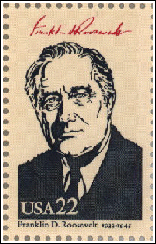FRtR > Outlines > The American Government > The Executive Branch: Powers of the Presidency > Constraints on Presidential Power
An Outline of American Government
The Executive Branch: Powers of the Presidency
Constraints on Presidential Power
*** Index * < Previous Chapter * Next Chapter > ***
 Because of the vast array of
presidential roles and
responsibilities, coupled with a conspicuous presence on the
national and international scene, political analysts have tended
to place great emphasis on the president's powers. Some have
even spoken of the "the imperial presidency," referring to the
expanded role of the office that Franklin D. Roosevelt maintained
during his term.
Because of the vast array of
presidential roles and
responsibilities, coupled with a conspicuous presence on the
national and international scene, political analysts have tended
to place great emphasis on the president's powers. Some have
even spoken of the "the imperial presidency," referring to the
expanded role of the office that Franklin D. Roosevelt maintained
during his term.
One of the first sobering realities a new president discovers is
an inherited bureaucratic structure which is difficult to manage
and slow to change direction. Power to appoint extends only to
some 3,000 people out of a civilian government work force of more
than three million, most of whom are protected in their jobs by
Civil Service regulations.
The president finds that the machinery of government operates
pretty much independently of presidential interventions, has done
so through earlier administrations, and will continue to do so in
the future. New presidents are immediately confronted with a
backlog of decisions from the outgoing administration on issues
that are often complex and unfamiliar. They inherit a budget
formulated and enacted into law long before they came to office,
as well as major spending programs (such as veterans' benefits,
Social Security payments and Medicare for the elderly), which are
mandated by law and not subject to influence. In foreign
affairs, presidents must conform with treaties and informal
agreements negotiated by their predecessors.
 The happy euphoria of the post-election "honeymoon" quickly
dissipates, and the new president discovers that Congress has
become less cooperative and the media more critical. The
president is forced to build at least temporary alliances among
diverse, often antagonistic interests -- economic, geographic,
ethnic and ideological. Compromises with Congress must be struck
if any legislation is to be adopted. "It is very easy to defeat
a bill in Congress," lamented President John F. Kennedy. "It is
much more difficult to pass one."
The happy euphoria of the post-election "honeymoon" quickly
dissipates, and the new president discovers that Congress has
become less cooperative and the media more critical. The
president is forced to build at least temporary alliances among
diverse, often antagonistic interests -- economic, geographic,
ethnic and ideological. Compromises with Congress must be struck
if any legislation is to be adopted. "It is very easy to defeat
a bill in Congress," lamented President John F. Kennedy. "It is
much more difficult to pass one."
Despite these burdensome constraints, few presidents
have turned down the chance to run for a second term of office.
Every president achieves at least some of his legislative goals
and prevents by veto the enactment of other laws he believes not
to be in the nation's best interests. The president's authority
in the conduct of war and peace, including the negotiation of
treaties, is substantial. Moreover, the president can use his
unique position to articulate ideas and advocate policies, which
then have a better chance of entering the public consciousness
than those held by his political rivals. When a president raises
an issue, it inevitably becomes subject to public debate. A
president's power and influence may be limited, but they are also
greater than those of any other American, in or out of office.
*** Index * < Previous Chapter * Next Chapter > ***
 Because of the vast array of
presidential roles and
responsibilities, coupled with a conspicuous presence on the
national and international scene, political analysts have tended
to place great emphasis on the president's powers. Some have
even spoken of the "the imperial presidency," referring to the
expanded role of the office that Franklin D. Roosevelt maintained
during his term.
Because of the vast array of
presidential roles and
responsibilities, coupled with a conspicuous presence on the
national and international scene, political analysts have tended
to place great emphasis on the president's powers. Some have
even spoken of the "the imperial presidency," referring to the
expanded role of the office that Franklin D. Roosevelt maintained
during his term.
 The happy euphoria of the post-election "honeymoon" quickly
dissipates, and the new president discovers that Congress has
become less cooperative and the media more critical. The
president is forced to build at least temporary alliances among
diverse, often antagonistic interests -- economic, geographic,
ethnic and ideological. Compromises with Congress must be struck
if any legislation is to be adopted. "It is very easy to defeat
a bill in Congress," lamented
The happy euphoria of the post-election "honeymoon" quickly
dissipates, and the new president discovers that Congress has
become less cooperative and the media more critical. The
president is forced to build at least temporary alliances among
diverse, often antagonistic interests -- economic, geographic,
ethnic and ideological. Compromises with Congress must be struck
if any legislation is to be adopted. "It is very easy to defeat
a bill in Congress," lamented